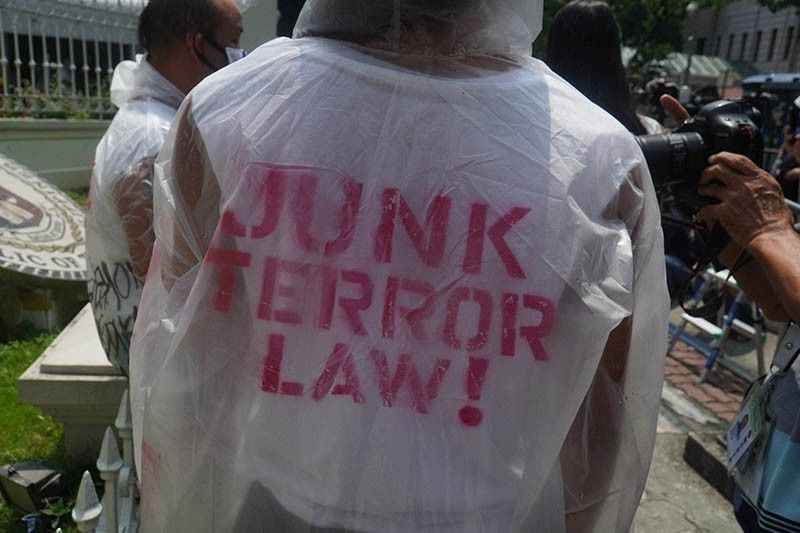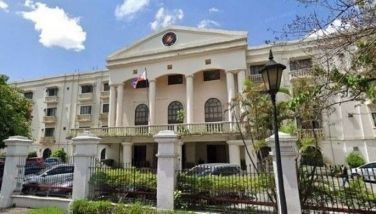In last submission to SC, petitioners say with anti-terror law, habeas corpus writ won't be issued

MANILA, Philippines — Petitioners against the Anti-Terrorism Act of 2020 insisted to the Supreme Court that the contentious law renders the extraordinary remedy writ of habeas corpus suspended for a suspected terrorist held under a section that allows warrantless detention up to 24 days.
In the memorandum filed by Rep. Edcel Lagman (Albay), the petitioners said a person detained under Section 29 of the law may file a petition for a writ of habeas corpus but due to the law’s wording, the writ will not be issued.
Lagman is one of the petitioners and oralists in the oral arguments on the legal challenges against the anti-terrorism law. The Supreme Court ordered parties to file their respective memoranda according to the cluster of issues they designated for the debates.
During the oral arguments, Section 29 was one of the heavily discussed portions of the law. Associate Justice Marvic Leonen had asked National Union of Peoples’ Lawyers chair Neri Colmenares if the petition for the writ of habeas corpus is still available to a person detained.
Habeas corpus literally translates to “produce the body.” It is an order to present a person before the court to determine if the arrest or imprisonment is legal or if the inmate must be released from custody.
READ: Colmenares fears anti-terror law may prompt junking of habeas corpus pleas
Under Section 29, law enforcers or military can take custody of a suspected terrorist, with written authorization of the Anti-Terrorism Council (ATC), up to 14 days and extendible with another ten days before the accused should be brought to judicial authorities and not incur any criminal liability.
Zeroing in on this, Lagman told the SC that “while the remedy of the writ of habeas corpus is available in cases of detention under Section 29 of the ATA, it is only available in the sense that the detained individual may apply for the writ before a court of competent jurisdiction.”
“Section 29 of the ATA gives one’s detention the color of legality, thereby ensuring that the writ of habeas corpus will not issue,” he added.
Lagman argued that the contentious section of the law suspends the writ of habeas data for a maximum of 24 days even though there is no invasion and rebellion nor does public safety demands it, which are requisites stated in the Constitution.
“Worse, the constitutional safeguards on the powers of the commander-in-chief in relation to the suspension of the privilege of the writ of habeas corpus have all been whimsically and unjustifiably set aside and disregarded, including the legislature’s power of review and revocation thereof,” he added.
Legal standing to file sue
Petitioners led by counsel John Molo, University of the Philippines College of Law professor, also asserted that they have a legal standing to sue—one of the arguments raised by the government for the dismissal of the legal challenges.
“Petitioners possess a personal stake in the constitutionality of the ATA as these consolidated Petitions are public actions involving public rights which are reserved to the People as a collective under the Constitution and may be invoked by anyone,” they said in a separate memorandum filed.
Solicitor General Jose Calida, in the government’s opening statement, said that petitioners “did not suffer any direct or indirect injury that will vest them with locus standi” in the case, unlike the two Aeta farmers who were charged with violation of the law.
READ: Leonen quizzes petitioners on running immediately to SC to assail anti-terrorism law
But the petitioners asserted: “The ‘injury in face’ requirement for questioning the constitutionality of the stature refers only to violations of individual rights. When a petition claims that public rights have been violated, any citizen can bring an action for their vindication by the courts.”
They claimed that due to the vague and overbroad provisions on terrorism, the public’s right to be secure against unreasonable searches and seizures—enshrined in Section 2, Article III of the Constitution—is threatened. Their right to “peaceably assemble and petition the government for redress of grievances” is also threatened, they added.
“This public right is under threat as the Office of the Solicitor General (OSG) conceded that rallies seeking Government’s redress of grievances can be considered ‘exercises of civil and political rights’ which are punished as terrorism by Section 4 of the ATA if committed with intent to ‘cause death or serious physical harm to a person, to endanger a person’s life, or to create a serious risk to public safety,’” their memorandum read.
The petitioners also argued that there is an actual case or controversy that makes the question on the law’s constitutionality ripe for judicial adjudication. They cited: Snatching powers from the Judiciary (issue judicial warrants and promulgate rules concerning the protection and enforcement of constitutional rights) and that the law abridges fundamental freedoms, including speech.
“These two contentious issues more than satisfy the requirement of ripeness for judicial review; that is, a showing of ‘adverse legal interests’ or ‘an active antagonistic assertion of a legal right, on the one hand, and a denial thereof, on the other,’” the petitioners told the court.
The Office of the Solicitor General will also file its separate memorandum to the court, but it has yet to make public its submission.
The ATA faces 37 petitions questioning its constitutionality. Oral arguments on these spanned nine settings in nearly four months. The law has been in effect for nearly a year now and has at least three ATA cases are pending in lower courts. Peace consultants have also since been designated as terrorists, while the red-tagging of progressives and dissenters continued as justices interpellated petitioners and government lawyers on the law.
- Latest
- Trending


































